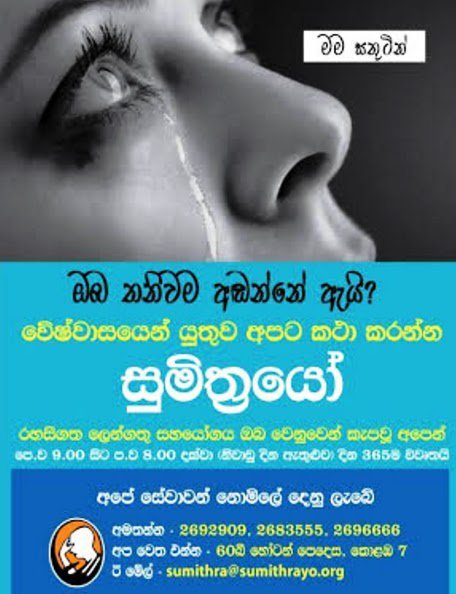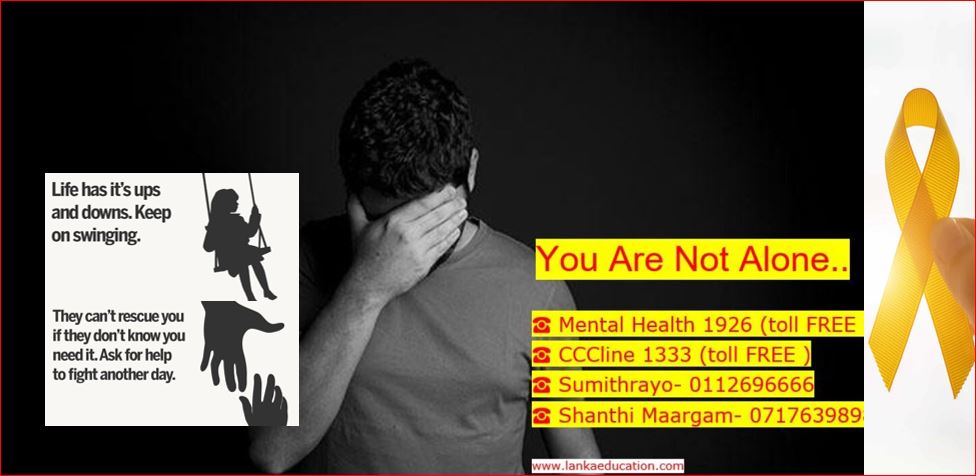Suicides Prevention Hotlines in Sri Lanka Call 1926 or 1333
Average of 08 persons die by suicide every day in Sri Lanka. If you or someone you love considering Suicide, Please Call below Suicides Prevention numbers.
SuicidePreventionSL Lifelines👇
☎️ Mental Health 1926 (toll FREE )
☎️ CCCline 1333 (toll FREE )
☎️ Sumithrayo- 0112696666
☎️ Shanthi Maargam- 0717639898
Sri Lanka had a suicide rate of 6.9/100,000 in 1950 which dramatically increased to 47/100,000 by 1995 to clock the highest in the world. But suicide prevention strategies implemented on recommendations by the Presidential Task Force of 1997 succeeded in bringing the rate down to 24/100,000 in 2004, 18/100,000 in 2014, and 16/100,000 in 2019. These included decriminalising the act of suicide (1998), a Life Skills Programme introduced by the Ministry of Education (1998), and banning the use of extremely toxic pesticides.
World Suicide Prevention Day falls September 10. September 10 World Suicide Prevention Day (WSPD) is an awareness day observed on 10 September every year since 2003, to provide worldwide commitment and action to prevent suicides.
Suicide, A major public health problem in Sri Lanka which demands our attention, but its prevention and control, unfortunately, are not an easy task. According to WHO, close to 800 000 people die globally by suicide every year, which is one person every 40 seconds. Furthermore, for each suicide, there are more than 20 suicide attempts.
Suicide is complicated and tragic, but it is often preventable. Knowing the warning signs for suicide and how to get help can help save lives.

How do I know that someone may be suicidal?
Being aware of warning signs can be potentially life-saving. Verbal markers are one way of identifying signs of suicidal ideation. They may sound something similar to the following:
“I feel like you and everyone would be so much better off without me.”
“I wish I was never born”
“I feel like I have no purpose”
“I feel numb”
Verbal markers can be either active (“I want to kill myself”) or passive (“I wouldn’t mind if I got hit by a bus…”) and it is important to look out for both types. Passive statements should be taken equally seriously.

How can someone’s behaviour indicate that they may be suicidal?
Sudden isolation from others
Researching methods to end one’s life on the internet
Increased agitation and mood swings
Reckless behaviour
Giving away what they own and writing last wills
Calling loved one’s/friends to say ‘good-bye’
Difficulties with sleep and appetite
Talking and writing about suicide
Loss of interest in daily and pleasurable activities
Loss of energy
Sudden positive mood after a period of being low
Purchase of materials intended for an suicide attempt
Additionally, if you or a loved one begins to feel irritable, hopeless, angry and anxious in addition to losing interest in activities that previously brought joy, these may also be other signs to be mindful of.

What can I do to help?
Take all talk of suicide seriously.
- Engage the person in a serious conversation – i. Connect in a personal way ii. Ask if they are experiencing a crisis in their lives iii. Are they feeling hopeless? iv. Have they withdrawn from daily activities?
i.e. Hey, I’ve noticed in the past few days that you seem rather low. I am concerned, and I am wondering if everything is okay…”
Ask about suicide using a caring approach
i.e. “I can see that you are going through a difficult time right now. Some people in your situation might feel like life is not worth living anymore. Have you felt this way?”
“Are you having thoughts about suicide?”
“Do you have thoughts about ending your life?”Explore risk by asking if they have a plan to attempt suicide and whether they have attempted suicide in the past.

Engage the person in a plan for safety
i. Do not leave the person alone
ii. Provide accessible contact information of crisis services
iii. Try to ensure that they do not use drugs or alcohol
iv. Be prepared to listen non-judgmentally
v. Do not promise confidentiality
Encourage the person to seek professional help as soon as possible.
Via Pulse. lk
For more information on mental health, see BetterHelp.

